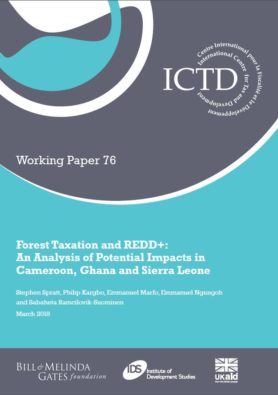ICTD Working Paper 76
This research explores the impacts that REDD+ could have on forest tax systems in three countries in sub-Saharan Africa, and considers how policy could be designed to increase the chances that these impacts are positive. To assess this, a methodological framework is identified and adapted. The framework has been used to explore how the implementation of a new policy regime affects the interests and thus behaviours of actors in related, existing regimes. The implementation of REDD+ in relation to forest tax systems seems well suited to such an approach.
The countries concerned are Cameroon, Ghana and Sierra Leone. While they are at different stages of the process, a common finding is that long-term impacts will depend on the detail of REDD+ design and implementation, and that many of the most important decisions have yet to be taken. Domestically, the key outstanding questions are: the extent of stakeholder participation in the design and implementation of programmes; how equitably financial benefits are distributed; whether REDD+ coverage is restricted to forest areas that are already protected, or extended to areas currently used for commercial forestry; how monitoring, reporting and verification (MRV) is implemented and whether this overlaps with forestry reporting practices; whether REDD+ is implemented nationally or locally; and whether existing or new channels are used.
